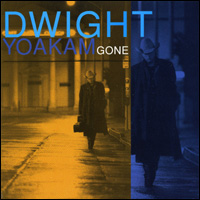
Dwight David Yoakam is an American country singer-songwriter, actor, and film director. He first achieved mainstream attention in 1986 with the release of his debut album Guitars, Cadillacs, Etc., Etc.. Yoakam had considerable success throughout the late 1980s onward, with a total of ten studio albums for Reprise Records. Later projects have been released on Audium, New West, Warner, and Sugar Hill Records.

If There Was a Way is the fourth studio album by American country music artist Dwight Yoakam, released on October 30, 1990. Five of its tracks would rise into the Top 40 of the Billboard Hot Country Singles chart in 1991 and 1992. They were "Turn It On, Turn It Up, Turn Me Loose" at No. 11, "You're the One" at No. 5, "Nothing's Changed Here" at No. 15, "It Only Hurts When I Cry" at No. 7 "Send a Message to My Heart", at No. 47, and finally the No. 18 "The Heart That You Own".

Buenas Noches from a Lonely Room is the third studio album by American country music singer Dwight Yoakam, released on August 2, 1988. The album contains Yoakam's first two No. 1 Hot Country Singles singles. The first was "Streets of Bakersfield," a duet with country music veteran Buck Owens, who had originally released a version of the song in 1973. The second was an original composition of Yoakam's titled "I Sang Dixie." A third song on the album, "I Got You," also an original composition, peaked at No. 5. The title song, "Buenas Noches from a Lonely Room ," also charted, but only to the No. 46 position.
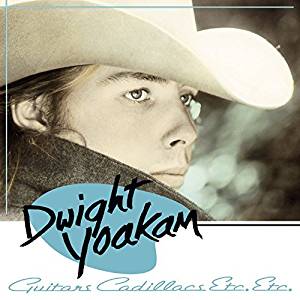
Guitars, Cadillacs, Etc., Etc. is the debut studio album by American country music artist Dwight Yoakam. This was Yoakam's first time working with long-time collaborator, record producer-guitarist Pete Anderson. The album became the first of three consecutive albums by Yoakam to reach number one on the Billboard Top Country Albums chart.

Hillbilly Deluxe is the second studio album by American country music singer-songwriter, Dwight Yoakam. Released in 1987, it was Yoakam's second consecutive No. 1 album on the Billboard Country Albums chart. Four tracks were released as singles with each becoming Top 10 hits on the Hot Country Singles chart in 1987 and 1988.

This Time is the fifth studio album by American country music artist Dwight Yoakam, released by Reprise Records on March 23, 1993. Three of its tracks barely missed the top spot on the Billboard Hot Country Singles charts, each peaking at #2: "Ain't That Lonely Yet", "A Thousand Miles from Nowhere" and "Fast as You", the latter being his last Top 10 single. Two other tracks also rose into the charts: "Try Not to Look So Pretty" at #14 and "Pocket of a Clown" at #22. The album itself peaked at #4 on the Top Country Albums chart. Yoakam wrote or co-wrote all except for one of the tracks on this album.

A Long Way Home is the ninth studio album by American country music artist Dwight Yoakam, released on June 9, 1998. It reached No. 11 on the Billboard Country Album, with two of its tracks charting on the Hot Country Singles chart. "Things Change" reached No. 17, while "These Arms" peaked at No. 57. Yoakam wrote all the songs on the album himself.
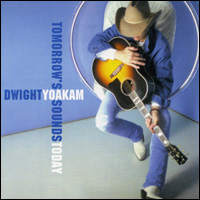
Tomorrow's Sounds Today is the eleventh studio album by American country music artist Dwight Yoakam. This album was released on October 31, 2000. It rose to No. 7 on the Billboard Country Albums chart. There were two charting singles among its tracks: "What Do You Know About Love" at No. 26 and "I Want You to Want Me" at No. 49 on the Hot Country Songs chart. Also included are two duets with Buck Owens, who was a big influence on Yoakam's musical style. It was also Yoakam's last studio album for the Reprise label. After that album's release, Yoakam left Reprise for Warner Bros. in 2001.

Population Me is the 13th studio album by Dwight Yoakam. It was released in June 2003 via the Audium Records label. The album spawned two singles, "The Back of Your Hand" and "The Late Great Golden State".
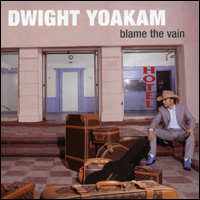
Blame the Vain is the 16th studio album by country music artist Dwight Yoakam, released in June 2005, and his first not to be produced by guitarist producer Pete Anderson. Yoakam wrote all the songs and produced the album himself. He also directed the videos for "Intentional Heartache" and the title track.
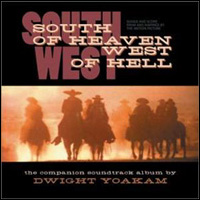
South of Heaven, West of Hell is country singer Dwight Yoakam's 12th studio album, and the first soundtrack album to the motion picture of the same name in which he starred, co-wrote and directed. Yoakam portrays a lawman in the early 1900s in the "wild west" of the Arizona Territory. Half of the tracks in the album are country music tracks. The other tracks are short snippets of straight dialog scenes from the film itself. There are many well-known co-stars in the movie, including Peter Fonda, Bridget Fonda, Paul Reubens, Billy Bob Thornton, Warren Zevon and Vince Vaughn. This was also Yoakam's only album for Warner Bros. after leaving Reprise.

Dwight Live is the first live album by country music artist Dwight Yoakam. It was released in 1995 on Reprise Records. Recorded at The Warfield in San Francisco, California in 1994 on his This Time Tour, this album comprises live renditions of seventeen of his songs.

Pete Anderson is an American guitarist, music producer, arranger and songwriter.

Dwight Sings Buck is country music artist Dwight Yoakam's 17th studio album, and a tribute album to Buck Owens. The album was released on October 23, 2007, by New West Records.

Under the Covers is the seventh studio album, and the first covers album recorded by Dwight Yoakam. It peaked at No. 8 on Billboard's Top Country Albums chart, and No. 92 on the Billboard 200.

dwightyoakamacoustic.net is the tenth studio album released in 2000 by American country music artist Dwight Yoakam. It features 25 of his songs recorded in an acoustic manner, save for "Little Sister" which also features Pete Anderson on electric guitar. The album peaked at #24 on the Billboard Top Country Albums chart and #195 on The Billboard 200.

Last Chance for a Thousand Years: Dwight Yoakam's Greatest Hits from the 90's [sic] is the second compilation album by American country music singer Dwight Yoakam. It includes 11 of his hit singles from the 1990s, as well as three new recordings. These new songs are a cover of Queen's "Crazy Little Thing Called Love", as well as an adapted rendition of Rodney Crowell's "Thinking About Leaving" and "I'll Go Back to Her", originally by Waylon Jennings. “Crazy Little Thing Called Love,” which hit #12 on the country singles chart and rose to #64 on Billboard’s Hot 100, was Yoakam's biggest hit single since 1993's "Fast as You." Last Chance for a Thousand Years has been certified gold by the RIAA.

Just Lookin' for a Hit is the first compilation album by American country music artist Dwight Yoakam. It includes eight singles from his 1980s albums for Reprise Records, as well as two newly recorded cover songs: "Long White Cadillac," originally recorded by The Blasters, and "Sin City," originally recorded by the Flying Burrito Brothers.

21st Century Hits: Best of 2000–2012 is the fourth greatest hits compilation album by American country music artist Dwight Yoakam. It was released by New West Records on October 1, 2013. It includes songs from the albums Tomorrow's Sounds Today, Population Me, Blame the Vain, Dwight Sings Buck and 3 Pears, as well as a previously unreleased duet with Michelle Branch and a cover of "Crazy Little Thing Called Love" from his previous greatest hits collection, the 1999 Last Chance for a Thousand Years, that also appeared on the soundtrack to the 2006 film The Break-Up.

Second Hand Heart is the 19th studio album by American country music artist Dwight Yoakam. It was released on April 14, 2015 via Warner Bros. Records.
